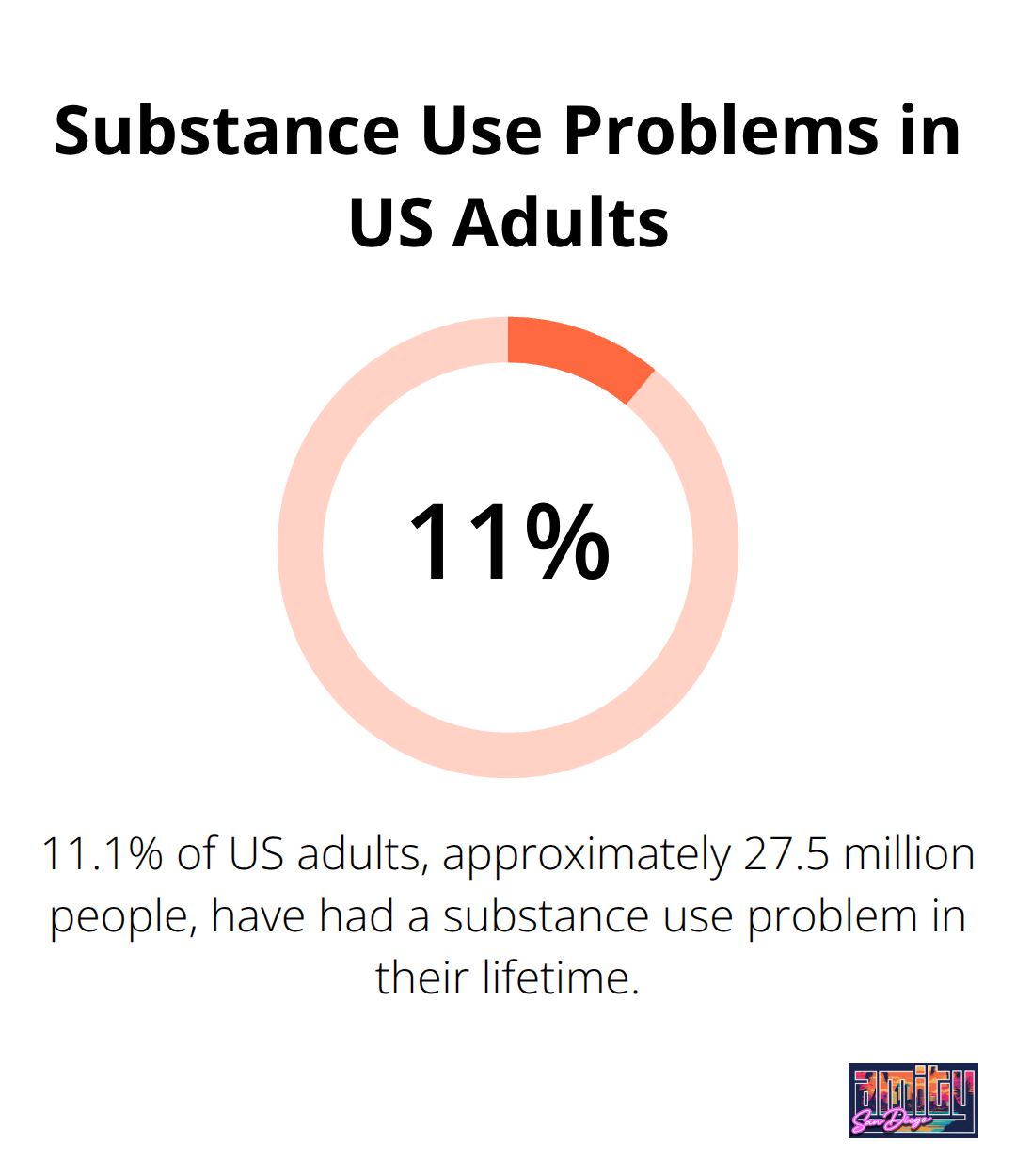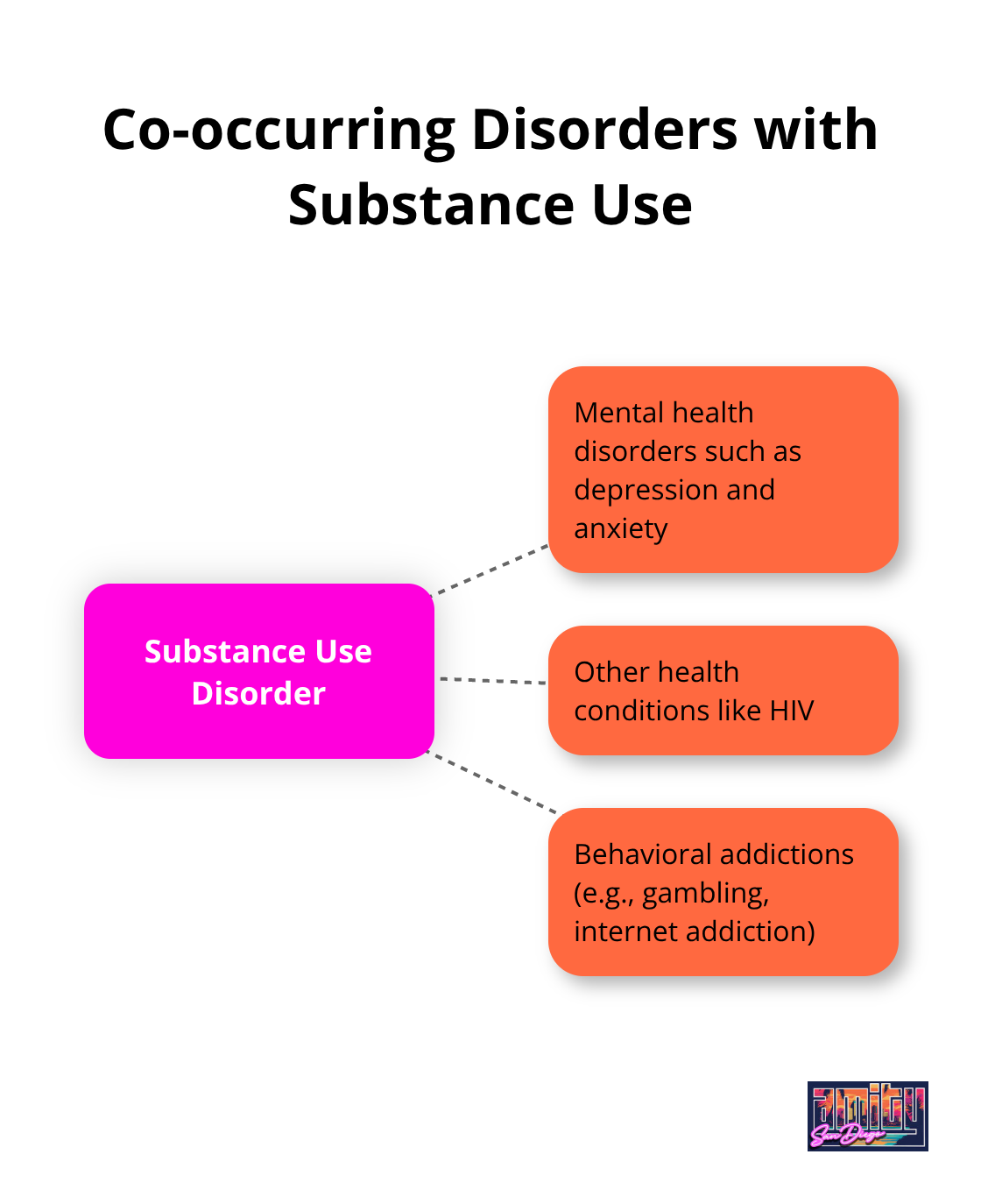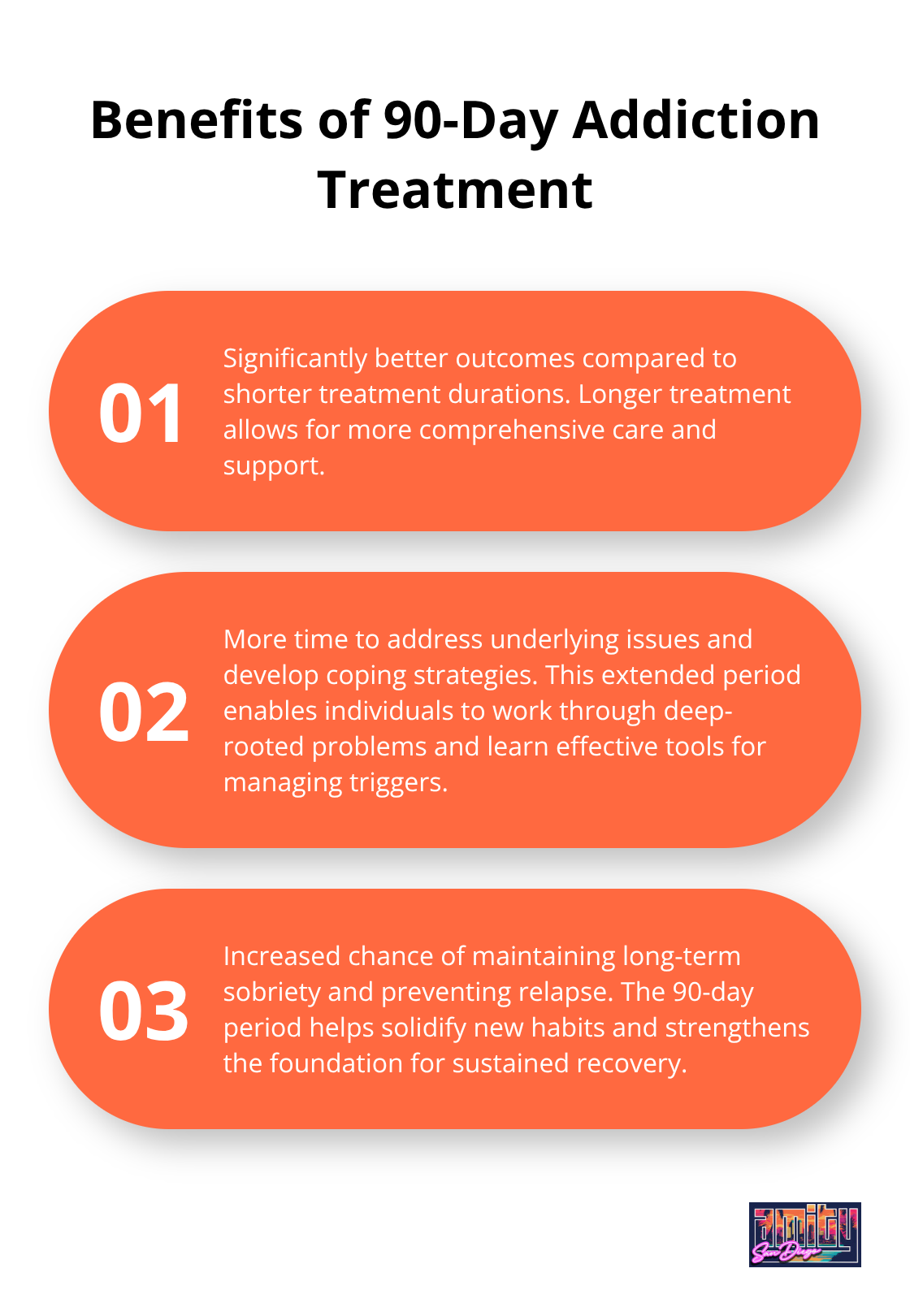At Amity San Diego, we’ve witnessed countless inspirational stories of recovery from drug addiction. These narratives of personal transformation remind us of the incredible strength within each individual.
Our blog post explores the journeys of those who’ve broken free from addiction’s grip, rebuilt relationships, and rediscovered their purpose in life. We’ll delve into the challenges faced, the crucial role of support systems, and the hope that recovery brings to those still struggling.
The Transformative Journey of Recovery
Breaking the Chains of Addiction
At Amity San Diego, we witness individuals break free from addiction’s grip and start a transformative recovery journey. This process of personal change challenges and rewards, often leading to profound life shifts.
The first step in recovery requires acknowledging the problem and deciding to change. A “rock bottom” moment or the realization that life has become unmanageable often triggers this decision. Recent estimates suggest that 11.1% of adults in the US, or approximately 27.5 million people, have had a substance use problem in their lifetime, demonstrating that recovery is both possible and achievable for many.

An effective strategy to break free from addiction involves identifying and addressing triggers. These triggers can include people, places, or situations that spark cravings. Recognition of these triggers allows individuals to develop coping mechanisms to avoid or manage them. Cognitive Behavioral Therapy (CBT) serves as a powerful tool in this process, helping people change negative thought patterns and behaviors associated with substance use.
Rebuilding Trust and Relationships
Addiction often strains or destroys relationships with family, friends, and colleagues. The recovery process must include rebuilding these connections. This task requires patience, honesty, and consistent effort.
One practical approach involves making amends. This process includes acknowledging past mistakes, taking responsibility for actions, and actively working to repair damaged relationships. However, a therapist or counselor should guide this process to ensure it occurs in a healthy, productive manner.
Family therapy can also play a significant role in healing relationships. A study published in the Journal of Marital and Family Therapy found that family involvement in addiction treatment can increase engagement in the recovery process and improve outcomes.
Rediscovering Purpose and Passion
Recovery extends beyond stopping substance use; it involves creating a fulfilling life without drugs or alcohol. This often includes rediscovering old interests or developing new ones.
Many people in recovery find purpose through helping others. Volunteering at addiction treatment centers or becoming a peer support specialist can provide immense rewards. Peer support groups included in addiction treatment show much promise in potentially reducing substance use, improving engagement, and reducing HIV/HCV risk.
Setting and achieving goals serves as another crucial aspect of finding purpose in recovery. These goals may relate to education, career, fitness, or personal growth. For example, many individuals in recovery pursue higher education or vocational training to open up new career opportunities.
We encourage our clients to explore various activities and find what resonates with them. This might include art therapy, mindfulness practices, or physical exercise. The key lies in finding activities that promote well-being and provide a sense of accomplishment and joy.
As we move forward in our exploration of recovery journeys, we’ll examine the obstacles individuals face on their path to sobriety and the strategies they employ to overcome these challenges.
Navigating Recovery Hurdles
The path to recovery from drug addiction presents numerous challenges. Let’s explore some of the most common obstacles and effective strategies to address them.
Conquering Withdrawal and Cravings
Withdrawal symptoms and intense cravings pose significant challenges in early recovery. These physical and psychological discomforts can derail even the most determined individuals. However, proven methods exist to manage these hurdles effectively.
Medication-Assisted Treatment (MAT) shows remarkable success in easing withdrawal symptoms and reducing cravings. Methadone, for example, blocks the symptoms of opiate withdrawal and reduces or eliminates craving for opiate drugs such as heroin, morphine, and codeine.
Beyond medication, the development of healthy coping mechanisms proves essential. Mindfulness techniques, such as deep breathing exercises and meditation, help manage cravings. A study in the Journal of Addiction Medicine found that mindfulness-based interventions significantly reduced substance use and cravings compared to control groups.
Addressing Co-occurring Mental Health Issues
Many individuals struggling with addiction also grapple with underlying mental health conditions. Co-occurring disorders are common, with people who have substance use disorders often experiencing co-occurring mental disorders or other health conditions such as HIV.

Integrated treatment for co-occurring disorders addresses both addiction and mental health issues simultaneously, leading to better outcomes. Evidence-based therapies such as Cognitive Behavioral Therapy (CBT) and Dialectical Behavior Therapy (DBT) treat conditions like depression, anxiety, and PTSD alongside addiction.
Sleep hygiene and regular exercise also play important roles in managing mental health. Prioritizing mental wellness on your recovery journey with practical tips and strategies for stress reduction and positive habits can foster a calm mind.
Overcoming Social and Environmental Triggers
Environmental factors and social relationships often play a significant role in addiction and recovery. The identification and management of these triggers is essential for long-term sobriety.
One effective strategy involves the creation of a “trigger management plan.” This plan identifies high-risk situations, develops avoidance strategies, and plans alternative responses. For instance, if certain friends or locations associate with substance use, it may become necessary to limit or eliminate exposure to these triggers (especially in early recovery).
Building a strong support network proves equally important. Engagement in support groups like Alcoholics Anonymous or SMART Recovery can significantly boost recovery outcomes. A study in the Journal of Substance Abuse Treatment found that individuals who attended support groups were 50% more likely to maintain abstinence at follow-ups compared to those who didn’t.
Family therapy also helps rebuild damaged relationships and create a supportive home environment. This can prove essential in navigating recovery hurdles and building a strong foundation for recovery.
As we move forward, we’ll explore the vital role that support systems play in the recovery journey, from professional treatment to the unwavering love of family and friends.
The Vital Role of Support Networks in Recovery
At Amity San Diego, we see how support systems impact long-term recovery success. A strong network of family, friends, professionals, and peers often determines the difference between relapse and sustained sobriety.
Family and Friends as Pillars of Strength
Family and friends often provide frontline support for individuals in recovery. Their understanding and encouragement prove invaluable. However, addiction strains relationships, making trust rebuilding a critical part of the recovery process.
Family therapy shows remarkable results in improving recovery outcomes. A study presented a narrative review and conceptual framework for research on family involvement across the continuum of substance use disorder (SUD) treatment.
Practical ways to involve family and friends in recovery include:
- Education about addiction and recovery
- Involvement in therapy sessions
- Encouragement to participate in support groups like Al-Anon
Professional Treatment: A Foundation for Recovery
Professional treatment at addiction facilities provides the structure and expertise needed for successful recovery. Evidence-based therapies, medical support, and personalized treatment plans address the complex nature of addiction.
The National Institute on Drug Abuse reports that individuals who stay in treatment for at least 90 days have significantly better outcomes than those who leave earlier. This underscores the importance of commitment to a comprehensive treatment program.

Key components of effective professional treatment include:
- Personalized treatment plans
- Evidence-based therapies (CBT, DBT, EMDR)
- Dual diagnosis treatment for co-occurring mental health issues
- Aftercare planning and support
The Power of Peer Support Groups
Peer support groups like Alcoholics Anonymous (AA) and Narcotics Anonymous (NA) play a vital role in recovery. These groups provide a sense of community, shared experiences, and ongoing support that complement professional treatment.
A study described four latent classes of AA attendance among 586 dependent alcoholics interviewed by telephone 1, 3, 5 and 7 years after baseline. This highlights the impact of peer support on long-term recovery.
Benefits of peer support groups include:
- Reduced feelings of isolation
- Learning from others’ experiences
- Accountability and motivation
- Access to a 24/7 support network
Building a Comprehensive Support Network
A robust support network combines family support, professional treatment, and peer groups. This multi-faceted approach provides the best chance for long-term recovery success.
Practical steps to build a comprehensive support network:
- Identify supportive family members and friends
- Engage in family therapy or education programs
- Commit to a professional treatment program
- Attend regular peer support group meetings
- Consider sober living arrangements for additional structure and support
Recovery requires a journey (not a destination). A strong support network provides the foundation for navigating the challenges of long-term sobriety and building a fulfilling life in recovery.
Final Thoughts
Inspirational stories of recovery from drug addiction showcase the human spirit’s resilience. These narratives highlight the transformative power of support systems in overcoming addiction. At Amity San Diego, we have seen numerous individuals reclaim their lives and rediscover purpose.
The path to recovery challenges individuals but offers immense rewards. Professional treatment programs provide a solid foundation for lasting change. These programs offer evidence-based therapies and personalized plans tailored to individual needs (including those at Amity San Diego).
If you or a loved one struggles with addiction, don’t hesitate to seek support. Recovery opens the door to a fulfilling life free from substance dependence. Take the first step today towards reclaiming your future by exploring addiction treatment options in San Diego.

